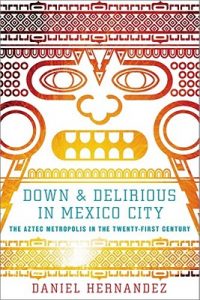 When I read journalist Daniel Hernandez‘s book Down & Delirious in Mexico City: the Aztec metropolis in the twenty-first century, I often found myself picturing the scenes he writes about illustrated by Los Bros Hernandez (no relation). Passionate soccer fans, punk and emo kids, decadent fashion designers, grieving families of kidnap victims, devotees of la Virgen de Guadalupe and of Santa Muerte — and moving among them all, Hernandez himself, “a sort of native foreigner — a Mexican born in the United States, Mexican but not quite.”
When I read journalist Daniel Hernandez‘s book Down & Delirious in Mexico City: the Aztec metropolis in the twenty-first century, I often found myself picturing the scenes he writes about illustrated by Los Bros Hernandez (no relation). Passionate soccer fans, punk and emo kids, decadent fashion designers, grieving families of kidnap victims, devotees of la Virgen de Guadalupe and of Santa Muerte — and moving among them all, Hernandez himself, “a sort of native foreigner — a Mexican born in the United States, Mexican but not quite.”
During his first year in Mexico City, even the air seems hostile: “My throat feels like a cat pissed in it and my head feels like it’s spent four hours listening to the same Daddy Yankee song on full volume, on loop.”
So what brought Hernandez to the Distrito Federal, and what’s kept him there? He explains early in the book:
“Mexico’s history, like any nation’s history, is not a tale of black and white, but a parade of gray. The Conquest, the Colonial period, the Inquisition, Independence, the Reformation, the Porfirian period, the Revolution, the era of modernization and authoritarian rule under the Institutional Revolutionary Party — all markers in a story of multiplying layers, where mestizaje is not only a state of ethnic mixing but of historical mixing as well. From a young age, figuring out where I fit into that story became my objective.”
Hernandez has been doing a lot of interviews about the book. I particularly recommend this one with DJ Rupture on WFMU, a conversation punctuated by music.
He was kind enough to answer a question from me, too.
SR: What struck me most in reading D&D was how you had to be simultaneously a participant and observer in order to access the scenes you were writing about. Were there times when you wished for a bit more journalistic distance? And, conversely, were there times when you wanted to lose yourself completely in an experience without thinking about how you might write about it? I’m just generally interested in your take on the relationship between journalist and subjects and how it can shift depending on what you’re covering.
DH: I definitely sometimes wanted more distance and definitely sometimes wish I had total freedom in an experience.
Sometimes with a source a relationship is formed. Sometimes I find myself suddenly involved in someone’s personal life. On the other hand, sometimes you’re having so much fun, or watching something so illegal or inappropriate for a family audience, you wish you didn’t have to document. That’s usually when I draw the line. This is too good for the page. Why share it all? I love editing and shaving anyway. Less is more.
Some stuff is just yours and not the readers’. Something else totally belongs to the reader and not you and you have to be responsible with it.
My one rule is to always keep in mind that your subject, the person or place you’re writing about, will one day read and consider what you wrote. Or should. I always try to keep that in mind. Will this person feel they were treated unfairly by the end of reading this? If so, I’m doing something wrong.
